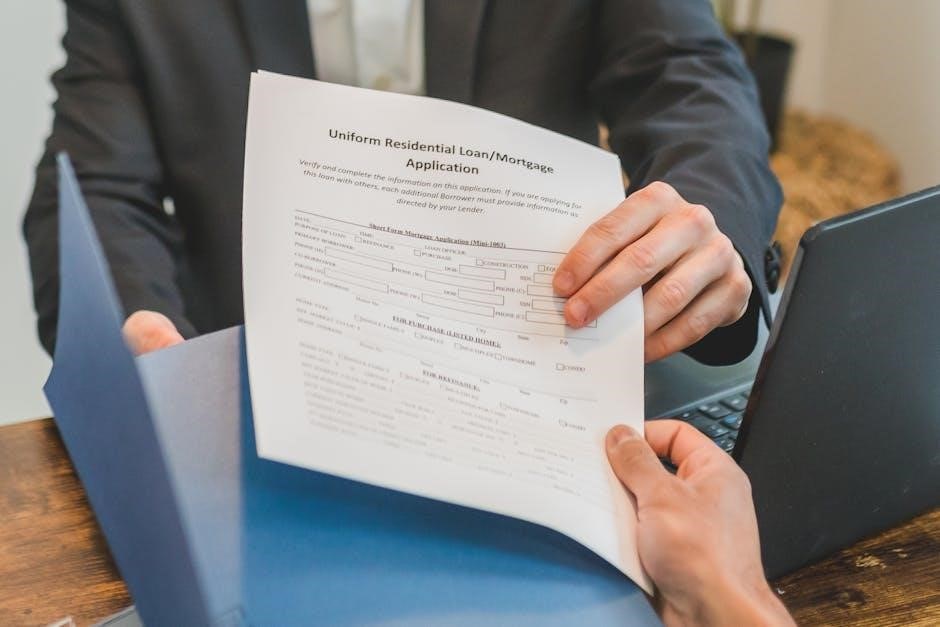
An Application to Vary or Revoke an AVO allows individuals to seek changes to existing Apprehended Violence Orders. This process is initiated through a formal court application, enabling parties to request modifications or cancellations of the order based on new circumstances or evidence. It provides a legal pathway to address evolving situations and ensure the order aligns with current needs and realities.
1.1 What is an AVO?

An Apprehended Violence Order (AVO) is a court-issued protection order designed to protect individuals from violence, harassment, or intimidation. It restricts the defendant’s behavior to prevent harm to the protected person. AVOs can be sought by police or victims and are legally binding, aiming to ensure safety and prevent further incidents of violence or threats.
1.2 Why Would Someone Want to Vary or Revoke an AVO?
Individuals may seek to vary or revoke an AVO due to changed circumstances, new evidence, or if the original order was granted without proper basis. This could include improved relationships, unnecessary restrictions, or if the order inadvertently causes harm. The goal is to ensure the order remains fair, reasonable, and aligned with current realities.
Legal Grounds for Varying or Revoking an AVO
Legal grounds for varying or revoking an AVO include changed circumstances, new evidence, or the court’s discretion to ensure fairness and protect the rights of all parties involved.

2;1 Changed Circumstances
Changed circumstances, such as a change in residence, employment, or relationship status, can serve as valid grounds to vary or revoke an AVO. Courts consider these changes to determine if the original order remains necessary or if modifications are required to reflect the current situation. This ensures the order stays relevant and effective.
2.2 New Evidence
New evidence that was not available at the time of the original AVO can be a strong basis for varying or revoking the order. This evidence must be credible and directly relevant to the case, potentially challenging the initial grounds for the AVO or demonstrating that the order is no longer justified. Courts carefully assess such evidence to determine its impact on the existing order.
2.3 Discretion of the Court
The court has the discretionary power to vary or revoke an AVO based on the merits of the case. This discretion is exercised after considering all relevant factors, including new evidence and changed circumstances; The court’s decision aims to balance the interests of both parties and ensure the order reflects the current situation fairly and justly.
The Application Process
The process involves obtaining the application form, completing it accurately, and submitting it to the court. A hearing may be scheduled to review the request.
3.1 Obtaining the Application Form
The application form to vary or revoke an AVO can typically be obtained from the court registry or downloaded from the court’s official website. Ensure the form is specific to your jurisdiction, as procedures may vary. Complete the form accurately, providing all required details and supporting documentation to avoid delays in processing.
3.2 Filling Out the Application

When completing the application to vary or revoke an AVO, ensure all sections are filled accurately. Provide personal details, the reasons for seeking changes, and any supporting evidence. Clearly outline the desired outcome and attach relevant documentation. Seek legal advice to ensure compliance with court requirements. Complete the form thoroughly and sign it as required.
3.3 Submitting the Application
Once completed, the application to vary or revoke an AVO must be filed with the court. Ensure all required copies are served on the other party. Submit the form and supporting documents to the appropriate court registry. The court will review the application and schedule a hearing if necessary. Legal advice is recommended to ensure proper submission.

Preparing for the Court Hearing
Prepare by gathering all evidence, organizing documents, and understanding court procedures. Practicing your testimony and seeking legal advice can help ensure a smooth and effective presentation of your case.
4.1 Gathering Evidence
Gathering evidence is crucial for a strong case. Collect documents like police reports, medical records, and witness statements. Photographs, emails, and any relevant communications can support your claims. Ensure all evidence is organized, dated, and directly relates to the reasons for varying or revoking the AVO. This preparation helps build credibility and strengthens your application.
4.2 Understanding Court Procedures
Understanding court procedures is essential for a successful application. Familiarize yourself with the court’s role, required documents, and filing processes. Ensure you understand the rules for submitting evidence and cross-examining witnesses. Properly completed forms and adherence to deadlines are critical. Failure to follow procedures may result in delays or dismissal of your application.
4.4 Legal Representation
Legal representation is crucial when applying to vary or revoke an AVO. A lawyer can guide you through the process, ensure your application is properly prepared, and advocate on your behalf in court. They can help you understand your rights, present evidence effectively, and address any opposition, significantly improving your chances of a successful outcome.
The Court Hearing
The court hearing is where both parties present their cases. The court assesses evidence, arguments, and circumstances to decide whether to vary, revoke, or maintain the AVO.
5.1 Presenting Your Case
Presenting your case involves clearly outlining the reasons for seeking changes to the AVO. You must provide evidence supporting your application, such as new circumstances or documentation. It is crucial to be prepared, concise, and honest in your presentation to ensure the court understands your position and the rationale behind your request.
5.2 Responding to Opposition
When responding to opposition, listen to the other party’s concerns and address them respectfully. Provide clear, evidence-based counterpoints to refute their arguments. Stay calm and composed, ensuring your response aligns with the facts presented. The court will assess both sides, so it is crucial to maintain professionalism and focus on the key issues at hand.
5.3 Court’s Decision
The court will evaluate the evidence and arguments presented by both parties. If the application is granted, the AVO may be varied or revoked. If denied, the original order remains in place. The court’s decision is final unless appealed. It is crucial to understand and comply with the court’s ruling, as non-compliance can lead to legal consequences. Appeals may be possible under specific circumstances.

After the Court’s Decision
Once the court makes its decision, it is essential to understand and comply with the new order. Any required actions, such as notifying relevant parties or updating records, should be completed promptly to ensure adherence to the court’s ruling.
6.1 Understanding the Outcome
The court’s decision will outline whether the AVO is varied, revoked, or remains unchanged. If varied, new conditions will be specified. If revoked, the order no longer applies. It is crucial to carefully review the written decision to understand the implications and ensure compliance with any new or amended conditions. This clarity helps all parties move forward effectively.
6.2 Next Steps
After the court’s decision, review the outcome carefully. If the AVO is varied or revoked, ensure all parties understand the new conditions. If unchanged, comply with the existing order. Consider seeking legal advice for further actions, such as appealing the decision, if necessary. Document all communications and maintain records for future reference to ensure accountability and clarity moving forward.

Enforcing a Varied or Revoked AVO
Ensure all parties are informed of the new order. Compliance with the varied or revoked AVO is mandatory. Breaches can lead to legal consequences, including fines or imprisonment. Proper documentation and communication with authorities are crucial to uphold the order effectively and maintain legal accountability.
7.1 Compliance with the New Order
Compliance with a varied or revoked AVO is mandatory. All parties must adhere to the updated terms, even if they objected to the changes. Ignoring the order can result in legal consequences. Understanding and following the new conditions ensures safety and prevents further legal complications. Proper documentation and communication with authorities are essential.
7.2 Consequences of Breach
Breaching a varied or revoked AVO can result in serious legal consequences, including fines and imprisonment. The court may also reinstate the original order or impose stricter conditions. It is crucial to understand and adhere to the new terms to avoid further legal complications and ensure compliance with the court’s directives.

Role of Legal Representation
Legal representation plays a crucial role in navigating the complexities of varying or revoking an AVO. A lawyer provides expert guidance, ensuring the application is well-prepared and presented effectively in court, significantly improving the likelihood of a successful outcome and protecting the applicant’s rights throughout the process.
8.1 When to Seek Legal Advice
Seek legal advice immediately if you are considering varying or revoking an AVO. A lawyer can guide you through the complex legal process, ensuring your application is well-prepared and complies with court requirements. They can also help navigate disputes and represent your interests effectively, maximizing the chances of a favorable outcome and avoiding costly procedural errors.
8.2 How a Lawyer Can Assist
A lawyer can assist by preparing and filing the application, gathering evidence, and representing you in court. They provide legal strategies, interpret complex laws, and advocate for your rights. Lawyers ensure your case is presented clearly and effectively, addressing the court’s concerns and increasing the likelihood of a successful outcome. Their expertise is invaluable in navigating the legal process.
State-Specific Variations
Different jurisdictions may have unique procedures for varying or revoking an AVO, with specific forms and requirements varying across states. Legal representation can help navigate these regional differences effectively.
9.1 Differences in Legislation
Legislation governing AVO variations differs across jurisdictions, with varying criteria for eligibility and evidence requirements. Some states may require additional documentation or follow specific court procedures, emphasizing the importance of understanding local laws when preparing an application to vary or revoke an AVO.
9.2 Local Court Procedures
An Application to Vary or Revoke an AVO is a legal process allowing individuals to modify or cancel existing Apprehended Violence Orders. This process involves submitting a formal request to the court, detailing reasons for the change, such as altered circumstances or new evidence. The goal is to ensure the order reflects current conditions and provides appropriate protection or relief.
Common Mistakes to Avoid
Common mistakes include failing to follow proper legal procedures, incomplete applications, and insufficient evidence. Avoid delays by ensuring all requirements are met and documentation is complete.
10.1 Procedural Errors
Procedural errors often occur when applicants fail to properly complete forms or miss deadlines. Ensuring all steps are followed meticulously and submitting documents on time minimizes such issues and strengthens the case for varying or revoking the AVO, helping to avoid unnecessary delays or dismissals of the application entirely.
10.2 Lack of Evidence
A common mistake is submitting an application without sufficient evidence to support the request. Insufficient or irrelevant evidence can weaken the case, leading to dismissal. Ensure all claims are backed by credible documents, witness statements, or other supporting materials to demonstrate the need for variation or revocation of the AVO effectively.
Frequently Asked Questions

This section addresses common questions about varying or revoking an AVO, offering clarity on the process, timelines, and legal implications. Frequently asked questions include:
- How long does the process take?
- What if the other party objects?
- Can I appeal the decision?
11.1 How Long Does the Process Take?
The duration of the process varies depending on court availability and case complexity. Simple cases may be resolved within a few weeks, while contested matters can take several months. Factors such as the urgency of the application and the court’s workload significantly influence the timeline. It’s essential to prepare thoroughly to avoid delays.
11.2 What if the Other Party Objects?
If the other party objects, the court will schedule a hearing to consider both sides; Evidence and arguments will be presented, and the court will weigh the merits of the application. Legal representation is crucial in such cases to ensure your position is effectively communicated and addressed. Preparation is key to achieving a favorable outcome.
11.3 Can I Appeal the Decision?
Yes, you can appeal the court’s decision if you believe it is unfair or incorrect. Appeals must be based on legal grounds, such as errors in law or procedure. Consult a lawyer to discuss your options, as time limits apply for filing an appeal. The appellate court will review the original decision to determine if it was reasonable and justified.